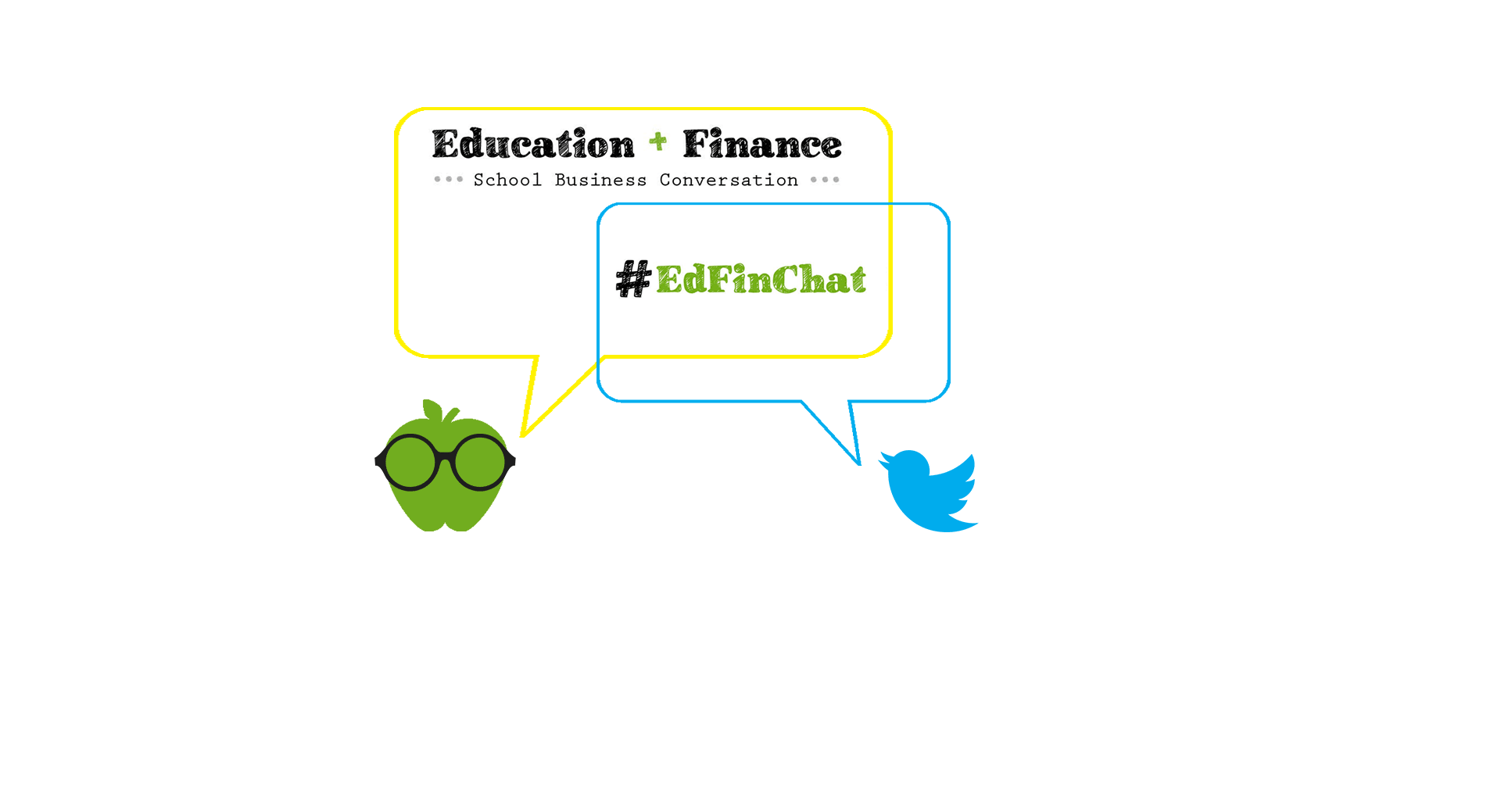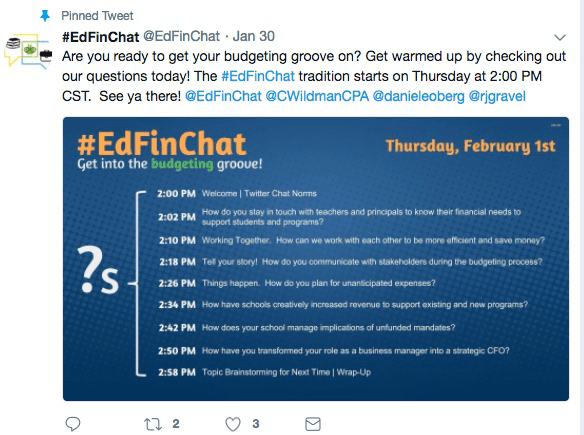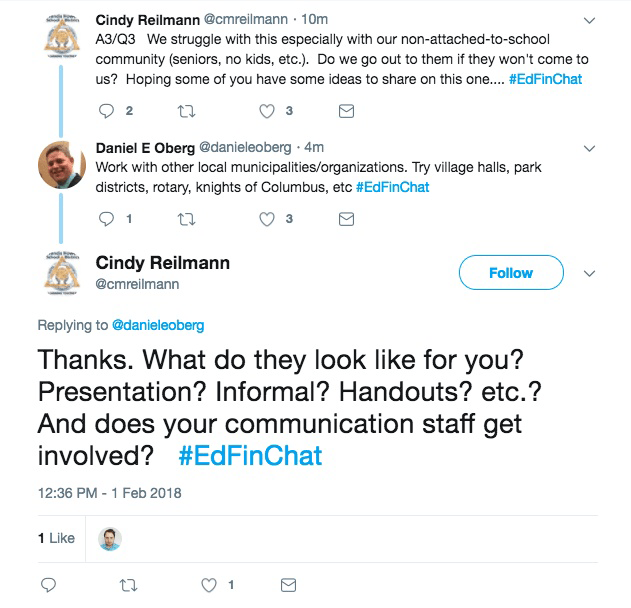Guest Post: Introducing #EdFinChat
BY Chris Wildman, CPA CGMA SFO
Editor's note: Advancing K12 readers will be familiar with the concept of the "new business office"—a shift toward adopting technology, embracing change, and connecting to a student-centered mission. We applaud the school leaders at the forefront of change and are thrilled to feature #EdFinChat co-creator Chris Wildman (@CWildmanCPA).
The seeds of #EdFinChat were planted when I was new to Twitter in April of 2017. My colleagues who used Twitter a lot invited me to join. Once I did, it was encouraging to discover all the good things happening in classrooms, operations, and technology. Twitter increased my awareness of the fantastic stories in public education.
I started sharing stories about what was going on in my own world, only to realize there wasn't a very large community of my peers. School business officers, chief financial officers, assistant superintendents of finance, and other school business leaders weren't actively tweeting. One Friday afternoon, I discussed with this my peers, Dan Oberg from CCSD 21 (@danieleoberg) and Dr. R.J. Gravel from Glenbrook High School District 225 (@rjgravel). We hatched the idea to create our own school business Twitter chat.
Much of the inspiration came from the book The Unlearning Leader: Leading for Tomorrow's Schools Today. Its authors, Michael Lubelfeld (who also happens to be our new superintendent in D112) and Nick Polyak, successfully started #suptchat for superintendents. We had a good idea but needed to take a leap of faith.
Preparing #EdFinChat
Dan, R.J., and I brainstormed and decided upon a goal: build a professional learning network to branch out to business managers in small schools who may not be able to make it to Illinois ASBO or other big conferences. We wanted to reach out to those business managers who didn't have a support network—and having some fun along the way would be a good thing. We chose the #EdFinChat (education finance chat) hashtag because we thought it would attract education leaders and school business people from all over who were interested in sharing good ideas and networking.From there, the work of promotion started. My wife created the #EdFinChat logo, and Dan, R.J., and I chose a kickoff date and started getting in contact with people to invite them. We called, emailed, and encouraged colleagues who we thought would be interested, but didn't know how Twitter or #edchats worked. There was a lot of direct messaging: "Hey, you haven't been on Twitter since 2010… Why don't you get back on?"
When we chose our first topic for #EdFinChat, it was important not to be overly generic or super specific. We settled on seven questions about budgeting, since the season was beginning soon. The majority were submitted from Wisconsin or the United Kingdom, which showed people were interested and wanted to be involved. We wanted the topic to be just right, so the chat would be equally open to people from outside our state of Illinois and outside of the United States.
International Followers
To accommodate school business managers (SBMs) from the UK, we chose 2:00 p.m. CST/8:00 p.m. GMT to allow for the six-hour difference. This global approach was important to us. Since I'm a British person working in the United States, I had a few followers who were SBMs from the UK and teachers in Ireland who were interested in what I do. Once we establish a connection, their next question is typically, "Hey, what do you do and how similar are our roles?"Schools in the UK, Australia, or the US absolutely have different legislative mandates, compliance issues, and environments for risk management. There are different rules about how schools are funded and how those funds are raised. However, at the end of the day, we're running classrooms. Teachers need supplies, schools have to be heated, everyone needs to be kept safe, and kids have to be fed. There's a vast amount of overlap in the operations and finance-universal norms about education, specifically public education: It's about having good teachers, fair classrooms, and how students get to school safe. Those are the best practices we need to talk about.
Our First #EdFinChat
We're getting to the exciting part: the first-ever #EdFinChat! You never really know how these are going to go, and the three of us had put a lot of time and thought into it, from creating the handle and hashtag to promotion to running the logistics of the day. We were really focused on the logistics (R.J. created a video to help participants learn to use Tweetdeck) and making the questions as solid as possible.
Overall, things went very well. Participants shared lots of great ideas, solutions, and questions. It was great to see side conversations stemming from the chat questions.



We got a lot of good feedback, a lot of new followers, and even direct messages from people saying thanks for doing this and remarking how we should have started it years ago! I'll add that R.J. was born to do Twitter chats. He's a master—it's like watching a wizard make alchemy. We even got a couple people telling us this was their first tweet—and that's pretty cool; someone created an account and their very first tweet was to introduce themselves in #EdFinChat.
Future Chats
From here, we'll build on what we've started, grow the number of participants, and work on finessing the chat itself. We'd like the topics for each chat to be as relevant and timely as possible, so no one finds themselves pulled away to work on something more important.#EdFinChat marks a new shift of school finance officers becoming strategic leaders and embracing technology for real-time networking. The old-school days of sequestered business managers handling school finance are done. Now everyone in a school district has the responsibility to tell their own story and be their own best advocates. We have to share our stories about what we're doing to contribute to education, because if we don't, we'll lose the narrative—and someone else will tell our story for us.
Shifting to a strategic role isn't about reinventing the wheel or being a pioneer. It's about discovering best practices and effectively using the resources available to us. We don't have time to design templates or models; instead, we stand on the shoulders of giants. If someone has done this before and established a best practice, let's roll it out to another district. #EdFinChat (and Twitter in general) is a good platform to make these connections. I don't have to spend hours going to a meeting. I don't have to call anyone. Twitter helps us share our good stories about operations and finance—we're part of the good stories coming out of public education every day.
We're looking forward to making new connections all around the world, and we have great support from Illinois ASBO, organizations in neighboring Wisconsin, and ASBO International. We're off to a good start—now we're going to watch the chat grow. Please join us @EdFinChat the first Thursday of each month and share the good things happening in your district.
Follow-up Resource: Twitter for Educators
New to Twitter? Get up and running (and all the #protips) in just 15 minutes with the EdTech Playbook: Twitter for Educators.WHAT'S NEXT FOR YOUR EDTECH? The right combo of tools & support retains staff and serves students better. We'd love to help. Visit skyward.com/get-started to learn more.

|
Chris Wildman, CPA CGMA SFO CFO/Treasurer/CSBO for North Shore School District 112 |




